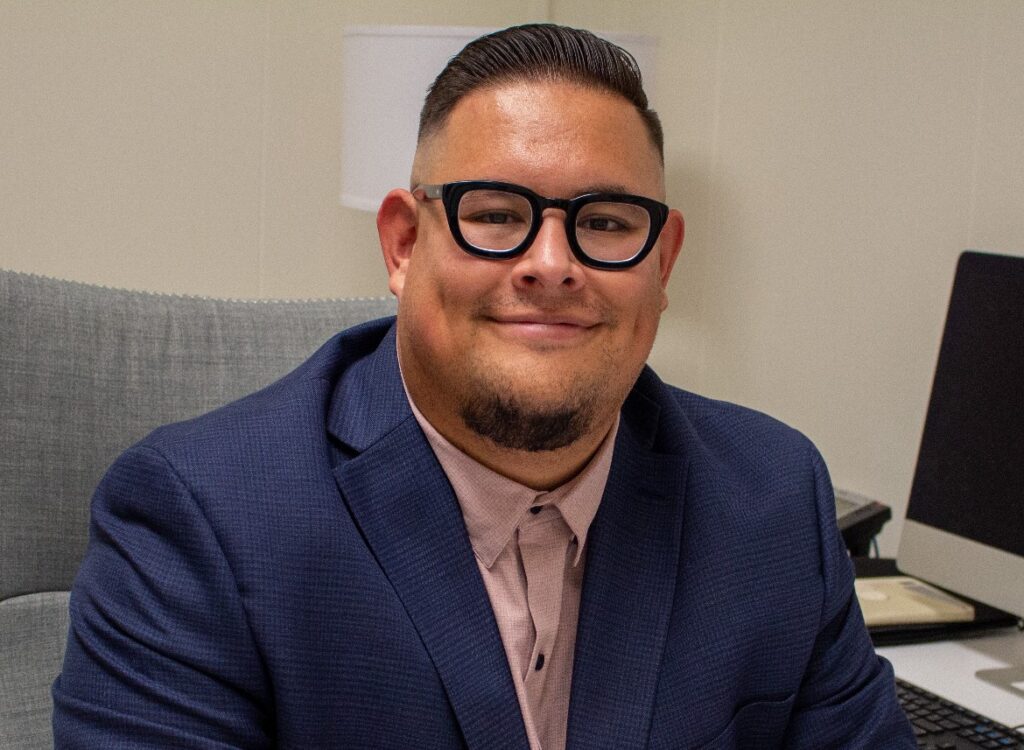
Through a course titled Cariño in the Time of Pandemic, students at Cal State Fullerton examined the relationships between public health, the COVID-19 pandemic, race, racism and social justice.
The course was one in a series of projects taken on by students as part of Latinx Lab for Storytelling and Social Justice.
Loosely translated from Spanish, cariño refers to taking care of someone.
“But it means a little bit more than just care,” said Mario Obando, associate professor of Chicana/o Studies, who developed and taught the course in Spring 2024. “It’s like tenderness and love as well. So, it’s kind of like this nice word that encompasses all of those.”
Established by a $1.2 million, three-year grant awarded in March 2022 by the Andrew W. Mellon Foundation, the Latinx Lab for Storytelling and Social Justice aims to facilitate storytelling by students through methods that delve deeper into the experiences of marginalized communities.
Students also have the opportunity to share their own narratives while building community and engaging in social activism.
The Latinx Lab is led by CSUF faculty in the Chicana and Chicano Studies Department within the College of Humanities and Social Sciences.
Gabriela Nuñez, chair and associate professor of Chicana and Chicano studies, said the word “lab” was chosen because it represents the spirit of discovery and experimentation.
“Many of our Latinx students who come to us without really identifying as Chicana, Chicano, Latinx don’t necessarily know a lot about their histories,” Nuñez said. “And so, for some students, it helps them to learn more about their heritage and their history.”
Part of Latinx Lab’s mission is to create an online digital hub and archives focused on disseminating Latinx stories and experiences beyond the Cal State Fullerton campus and local communities.
For Cariño in the Time of Pandemic, Obando’s students conducted two-part interviews with loved ones and close friends, and those interviews are being preserved as oral histories.
Destiny Trujillo, an undergraduate majoring in Chicano/a Studies, was among the 20 students to take the course. She said Obando’s guidance through the proper protocols of conducting professional research gave the course a level of legitimacy.
“What I appreciated about this class, specifically, is that Mario took us through the certification of being a researcher of humanities and social science,” Trujillo said. “It was really awesome because it makes you feel like you’re approaching your work more seriously.”
The first interviews were designed to gather biographical information about their subject in order to gain a clear understanding of their backgrounds and the care work they performed.
For the second interview, students asked specific questions related to the first year of the pandemic, from initial reports in February and March of 2020 and the shutdowns and life during the quarantine.
From the collection of interviews, experiences trended differently, depending on gender and socioeconomic class and within multigenerational families, Obando said.
Interviews also included questions centering around civil unrest in Black communities stemming in large part from the murder of George Floyd in May 2020, the presidential election cycle, and even the raging fires in the San Gabriel Valley at the time.
“So, it was an exploration of the pandemic, but also in relationship to social issues and environmental issues, and how folks used the care work that was revealed in the first interview that started to play out in the first year of the pandemic,” Abando said. “And we had some really interesting findings in their oral histories.”
Following the interviews, the students met for a series of roundtable discussions about what they learned from the process.
The generally accepted narrative emanating from the mainstream was that society was unprepared for the pandemic, Obando said.
But the oral histories suggested the opposite was true within underserved populations, the professor said.
“Some of us were actually very equipped to deal with the emotional side of it,” Abando said. “Not necessarily the specificity of a virus, but in terms of how do you keep a family together? How do you organize new schedules and quarantine? How do you have difficult conversations? All of that became very clear because of the qualitative work that students were doing.”
Trujillo interviewed a friend who she became close with while they worked together at a skate shop in the mall.
Trujillo said her friend is a UCLA student with a minor in Ethnic Chicano Studies, a single mother with a strong work ethic and the only female store manager in the region.
“We really, really bonded over being these abolitionist feminist Chicana brown women,” Trujillo said. “I really loved hearing about her experiences and also living through these experiences with her … talking about these real-life, living histories that were happening, and I felt like she really understood the way that we are playing active characters in a role in history. It blows my mind.”
Related Articles
CSUF professor explains the lasting power of ‘Frankenstein’
Arboretum’s ‘living laboratory’ expands horizons for CSUF faculty, students
CSUF’s new Visual Arts Complex fosters collaboration, community engagement
CSUF’s College of Education celebrates 20 years training tomorrow’s educators
CSUF’s TAPP Center has the ‘secret sauce’ to support nontraditional students
